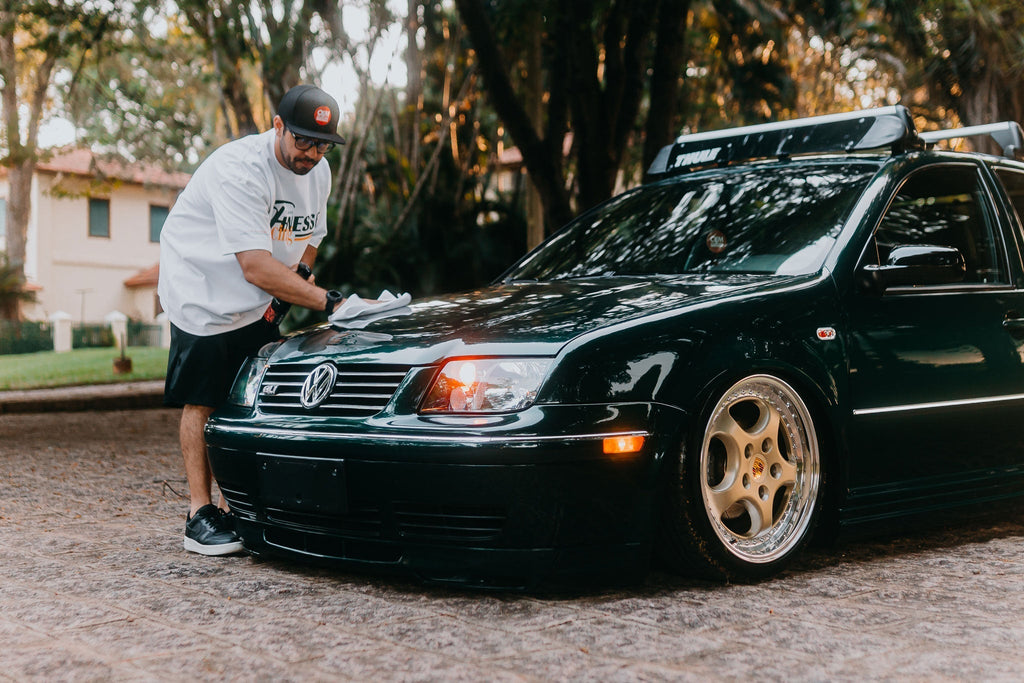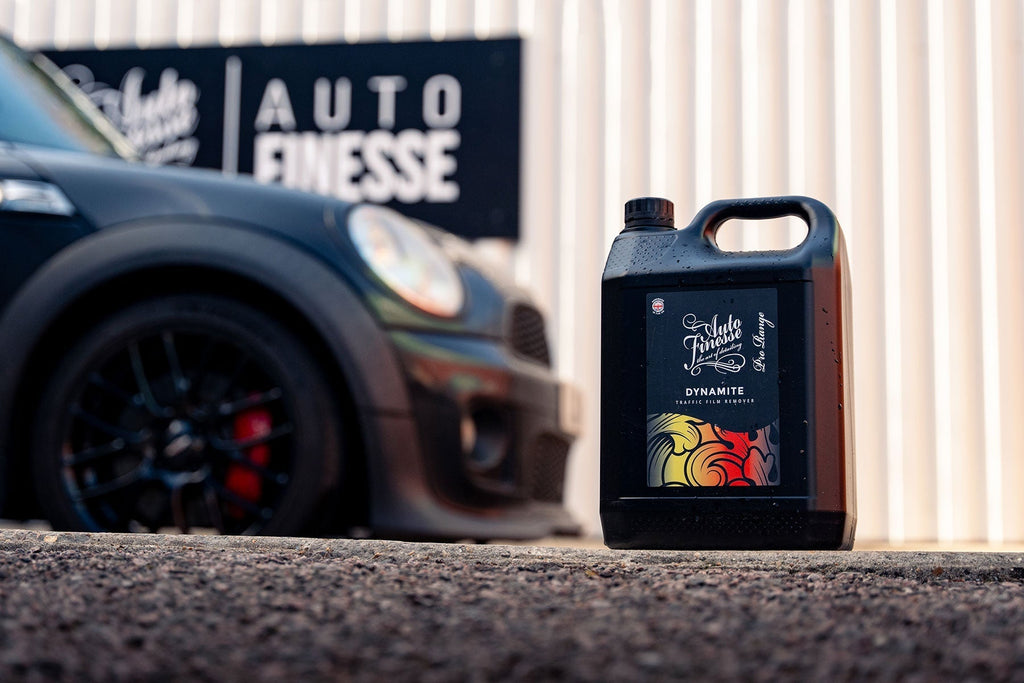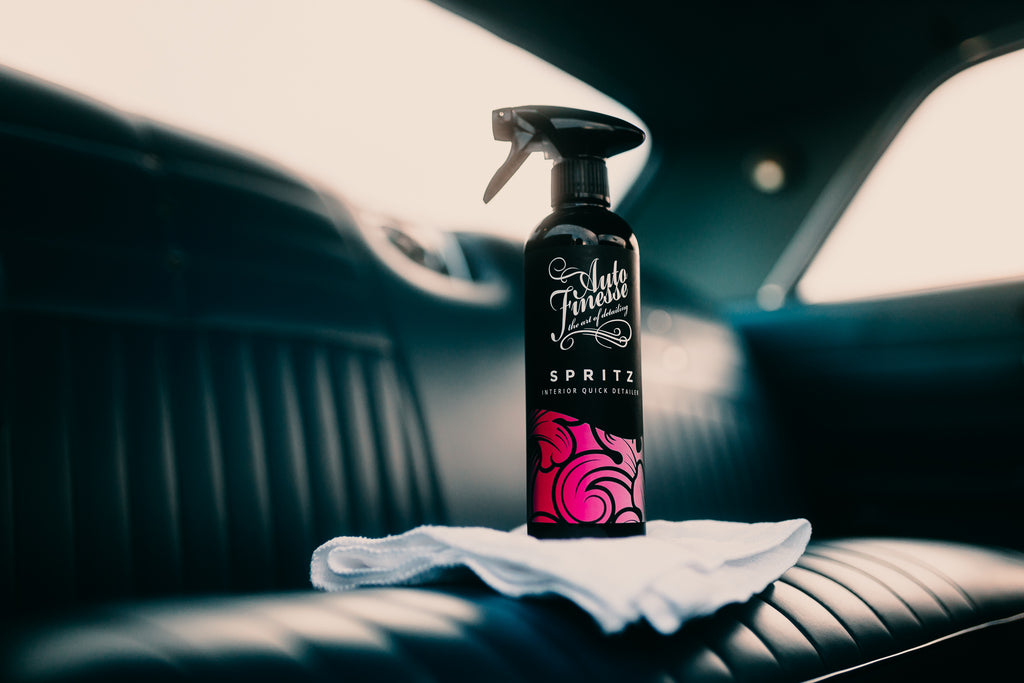Iron Out Fallout Remover
Iron Out Fallout Remover Fallout Remover
Microfibre Cloth
Safely dissolves embedded iron
Heavy-Hitting Fallout remover
This heavy contamination is most commonly found on daily drivers and vehicles that rack up a high amount of motorway mileage. It is extremely important to remove these particles, especially prior to any sort of polishing or paint correction, to prevent them being pulled out and dragged across top layers inflicting damage like scratches and swirl marks.
Safely dissolves embedded iron
The formula is designed to turn blood red, temporally highlighting the contamination as it creates a solute - locking dissolved metal in the solution and away from surfaces, allowing it to be safely rinsed away.
The start of a 3-stage decontamination
Iron Out can be followed with ObliTARate Tar and Glue Remover to eradicate tar, traffic cone rash and other sticky residues. And finishing with a Clay Bar (and Glide Clay Lube) to physically pull-out protein and mineral deposits from sources such as rainwater and bird droppings.
Powerful degreasers and cleaning agents
Aside from being the professional solution for paintwork and glass decontamination, it also contains powerful degreasers and cleaning agents, making it the ideal product for decontamination and deep-cleaning on painted and powder coated wheels. Using Iron Out every few months can prevent the onset of heavy corrosion and the risk of structural failure.
Product Information
Developed as a heavy-hitting ferrous fallout remover, Iron Out is an advanced decontamination remover in a reactive gel, capable of safely and effectively eradicating the sharp, embedded metal particles that are impossible to abolish by washing alone.
Iron contamination is chiefly derived from brake dust (but can come from other sources such as train lines) and is essentially tiny pieces of metal shrapnel floating around in the air with sharp, serrated ages that can embed themselves in softer surfaces such as paintwork and glass. In many cases, especially on lighter paintwork finishes, this contamination can present itself as small rusty spots, on others it may not be immediately obvious but even the unseen particles can pose a huge problem. This heavy contamination is most commonly found on daily drivers, frequently-breaking city cars and vehicles that rack up a serious amount of high-speed motorway mileage. It is extremely important to remove these particles, especially prior to any sort of polishing or paint correction, to prevent them being pulled out and dragged across top layers inflicting damage like scratches and swirl marks. It’s also crucial to carry out the metal decontamination process before adding protection layers, which can essentially lock these highly corrosive particles in, allowing them to cause damage, even under the surface. The only way of safely purging surfaces of this kind of heavily embedded contamination is through intense chemical removal, making Iron Out the ideal decontamination solution.
Iron Out promotes a chemical reaction, which is often referred to as ‘bleeding’. As the embedded iron is dissolved safely into the solution, the formula is designed to turn blood red, temporally highlighting the contamination as it creates a solute - locking dissolved metal in the solution and away from surfaces, allowing it to be safely rinsed away. Iron out changing colour indicates that the solution has reacted, contains the contamination, and is ready to be rinsed.
Safe for use on most exterior surfaces, including paintwork, aluminium, magnesium, stainless-steel, anodised finishes, chrome, glass, plastic and even rubber, Iron Out can be utilised as a stand-alone decontamination product, or as the first step of a full 3-stage decontamination process. By following up with ObliTARate Tar & Glue Remover to eradicate tar, traffic cone rash and other sticky residues. And finishing with a Clay Bar (and Glide Clay Lube) to physically pull-out protein and mineral deposits from sources such as rainwater and bird droppings, surfaces will be fully decontaminated and in prime condition for polishing. For more information on this process see our full guide - How to safely Decontaminate Paintwork.
While the metal contamination is quickly liquified into the solution, Iron Out can also be lightly agitated on the most heavily contaminated areas, with a Foam or Microfibre Applicator. This process isn’t to help remove the ferrous particles physically, but simply to refresh the solution, moving away ‘spent’ product (the solute already containing dissolved metal) to replenish the area with fresh solution to further react with any remaining contamination. After agitation, the solute can be safely rinsed away. This process should be performed every 3-6 months on daily driven vehicles in preparation for adding paintwork protection.
Aside from being the professional solution for paintwork and glass decontamination, Iron Out Fallout Remover also contains powerful degreasers and cleaning agents, making it the ideal product for periodical decontamination and deep-cleaning on painted and powder coated wheels. It’s obvious that alloy wheels tend to suffer from a heavier concentration of brake dust contamination than any other vehicle area, so using Iron Out every few months can prevent the onset of heavy corrosion and the risk of structural failure. Iron Out can even be brushed-in using Revolution Wheel Soap and Imperial Wheel Cleaner for more effective cleaning on wheels and even exhaust tips. For the full rundown on the best way to use Iron Out on any alloy wheel finish see our guide – Clean Your Wheels More Effectively.
In addition to our 500ml bottles, Iron Out Contaminant Remover is also available in 1-Litre and 5-Litre containers. Iron Out can also be used with our Pro Mixing Bottle.
For a selection of professional tips on using this product most effectively check out our article – Get Even More From Your Iron Out.
•We recommend avoiding brake discs and pads when using this product.
•Do not leave to dry on the vehicle.
Product Summary
FAQ
Popular questions from our customers

![]() Need help call +44 (0)1279 912 912
Need help call +44 (0)1279 912 912
We are here to help with all your questions.*














